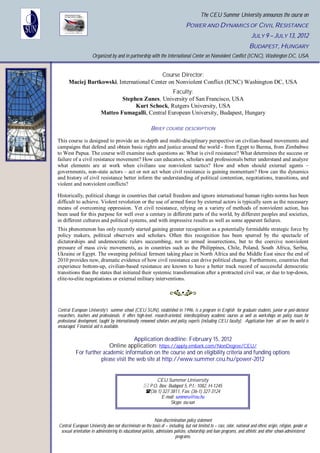
CEU Summer Course on Power and Dynamics of Civil Resistance
- 1. The CEU Summer University announces the course on PPOOWWEERR AANNDD DDYYNNAAMMIICCSS OOFF CCIIVVIILL RREESSIISSTTAANNCCEE JJUULLYY 99 –– JJUULLYY 1133,, 22001122 BBUUDDAAPPEESSTT,, HHUUNNGGAARRYY Organized by and in partnership with the International Center on Nonviolent Conflict (ICNC), Washington DC, USA Course Director: Maciej Bartkowski, International Center on Nonviolent Conflict (ICNC) Washington DC, USA Faculty: Stephen Zunes, University of San Francisco, USA Kurt Schock, Rutgers University, USA Matteo Fumagalli, Central European University, Budapest, Hungary BRIEF COURSE DESCRIPTION This course is designed to provide an in-depth and multi-disciplinary perspective on civilian-based movements and campaigns that defend and obtain basic rights and justice around the world - from Egypt to Burma, from Zimbabwe to West Papua. The course will examine such questions as: What is civil resistance? What determines the success or failure of a civil resistance movement? How can educators, scholars and professionals better understand and analyze what elements are at work when civilians use nonviolent tactics? How and when should external agents – governments, non-state actors – act or not act when civil resistance is gaining momentum? How can the dynamics and history of civil resistance better inform the understanding of political contention, negotiations, transitions, and violent and nonviolent conflicts? Historically, political change in countries that curtail freedom and ignore international human rights norms has been difficult to achieve. Violent revolution or the use of armed force by external actors is typically seen as the necessary means of overcoming oppression. Yet civil resistance, relying on a variety of methods of nonviolent action, has been used for this purpose for well over a century in different parts of the world, by different peoples and societies, in different cultures and political systems, and with impressive results as well as some apparent failures. This phenomenon has only recently started gaining greater recognition as a potentially formidable strategic force by policy makers, political observers and scholars. Often this recognition has been spurred by the spectacle of dictatorships and undemocratic rulers succumbing, not to armed insurrections, but to the coercive nonviolent pressure of mass civic movements, as in countries such as the Philippines, Chile, Poland, South Africa, Serbia, Ukraine or Egypt. The sweeping political ferment taking place in North Africa and the Middle East since the end of 2010 provides new, dramatic evidence of how civil resistance can drive political change. Furthermore, countries that experience bottom-up, civilian-based resistance are known to have a better track record of successful democratic transitions than the states that initiated their systemic transformation after a protracted civil war, or due to top-down, elite-to-elite negotiations or external military interventions. Central European University's summer school (CEU SUN), established in 1996, is a program in English for graduate students, junior or post-doctoral researchers, teachers and professionals. It offers high-level, research-oriented, interdisciplinary academic courses as well as workshops on policy issues for professional development, taught by internationally renowned scholars and policy experts (including CEU faculty). Application from all over the world is encouraged. Financial aid is available. Application deadline: February 15, 2012 Online application: https://apply.embark.com/NonDegree/CEU/ For further academic information on the course and on eligibility criteria and funding options please visit the web site at http://www.summer.ceu.hu/power-2012 Non-discrimination policy statement Central European University does not discriminate on the basis of – including, but not limited to – race, color, national and ethnic origin, religion, gender or sexual orientation in administering its educational policies, admissions policies, scholarship and loan programs, and athletic and other school-administered programs. CEU Summer University P.O. Box: Budapest 5, P.f.: 1082, H-1245 (36 1) 327 3811, Fax: (36-1) 327-3124 E-mail: summeru@ceu.hu Skype: ceu-sun